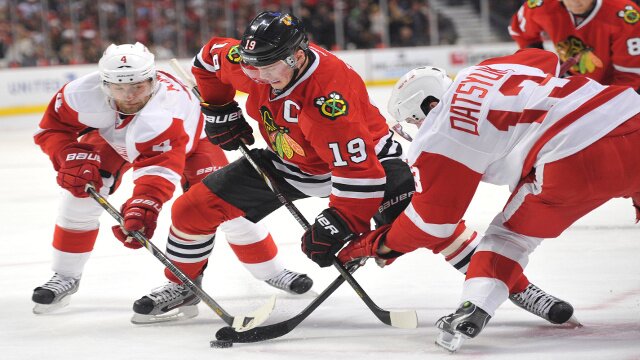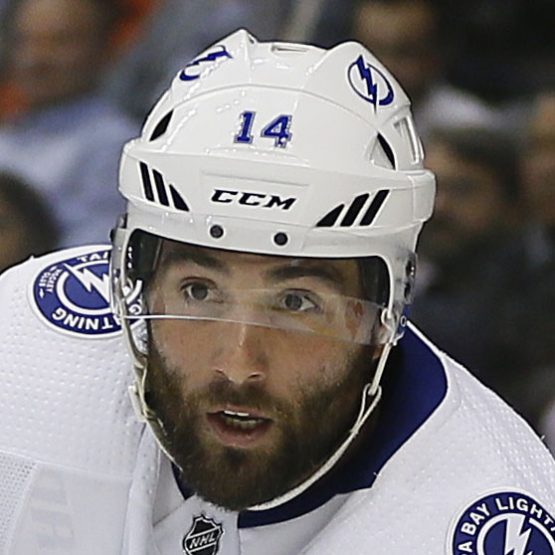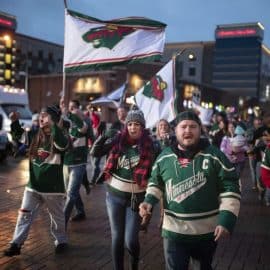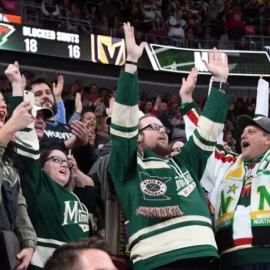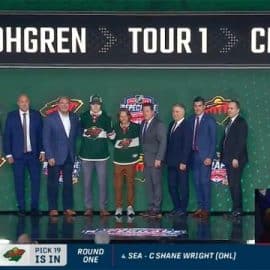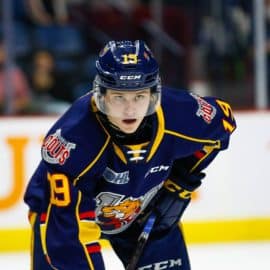Perhaps its only natural, but after a season ends you sort of reflect on what happened and on what could have been when you come up short of winning a championship. You ask yourself what mistakes were made, what improvements can be had internally and perhaps take stock on what must add or subtract for a better chance at success next season. I have little doubt, 29 teams in the NHL will be doing just that at the conclusion of this season and for most of these teams that process has already started. For some clubs it means you start the process of 'cleaning house' by making some personnel changes, most notably by firing the head coach like Dallas, Colorado and Vancouver have done by dropping the axe on Glen Gulutzan, Joe Sacco and Alain Vigneault respectively. In some cases it goes even a little bit hire as GM's are dismissed like Dallas handed Joe Nieuwendyk a pink slip. I doubt they'll be alone, to say nothing of the various overhauls of team rosters somewhat triggered by the lowering of the salary cap from $70.4 million down to $64.3 million for the 2013-14 season.
The Wild are no different. If the last two seasons have taught Wild fans anything is to expect change, and lots of it. It all started at the 2011 NHL Entry draft when the Minnesota Wild traded Brent Burns to the San Jose Sharks for Devin Setoguchi, Charlie Coyle and the 1st round pick that became Zack Phillips. We followed it up with two more trades with the Sharks that saw us shipping out Martin Havlat and James Sheppard for Dany Heatley and a 3rd round pick respectively. The next summer the Wild signed Zach Parise and Ryan Suter to the tune of $198 million, as well as bringing in another San Jose Shark in Torrey Mitchell and tough guy Zenon Konopka. What do the Wild have to show for all of their moves? Just one playoff appearance in the last two years, and just one playoff victory. As I watched the Detroit Red Wings battle the same Chicago Blackhawks squad that dispatched the Wild in a mere 5 games, I keep asking myself why is the 7th seeded Red Wings doing so much better (leading their series 3-1) than Minnesota did?
Click on "Continue Reading" for the rest of the article…

Now this could be the part of the article where I just tear the Wild apart with a variety of terse and sarcastic statements. Yet what would that really accomplish? All it would do is indicate I'm angry with the team and I am unsatisfied. I wouldn't not say the Wild were successful in the playoffs, but their performance was not all that surprising. So why is Detroit performing so much better than the Wild did against Chicago?
Just thinking back to the Wild's series with Chicago it would be easy to point to the team's epic failure at the power play as the main culprit but I think its far more basic than that. The Wild played very well against Detroit, winning 3 out of the 4 games they played against the club from the Motor City. How can a team the Wild dominated be doing so much better against Chicago? Two areas (intangibles) really jumped out at me.
Physical play from the team's defense
In some ways the Wild's blueline is similar to that of the Detroit Red Wings. Both clubs value the mobile, puck-moving defenseman. In fact, in terms of size the Wild's defense is just slightly smaller than that of Detroit but this where the similarities end. The Wild's defense was unable to match the physical strength of the Blackhawks which brutalized the club's defenseman. When the Wild's defenseman tried step up physically they'd normally see the worst of it. No offense to Jonas Brodin, who had a terrific season, but he really was no match to win the tough battles near the crease. Ryan Suter is not a bruiser, nor is Tom Gilbert, Marco Scandella and the diminutive Jared Spurgeon. Clayton Stoner who was banged up, but also struggling late in the season was played sparingly which made it that much easier for Chicago in the Wild's end. I'm not saying that if we only would've played Stoner more the more competitive they would've been. It is just a realization how 'soft' the Wild's blueline is, especially when you compare how they play to the Red Wings' d-corps.
The Red Wings defenseman have stepped up their physical play and helped neutralize the Blackhawks forwards. Jonathan Toews, getting shadowed each shift and being buried when he tries to get to the crease. Wild killer Bryan Bickell? Getting folded like a deck of cards by the strong play of Jonathan Ericsson. No Wild defenseman was able to do that to Bickell who operated with impunity in the Wild zone. Brendan Smith, Kyle Quincey, Jakub Kindl, Carlo Colaiacavo, and especially Niklas Kronwall have made Chicago's life unpleasant and been strong near the crease depriving Chicago from those 2nd chance opportunities against Jimmy Howard. Minnesota attempted to play more physically, but most of that was from its forwards as Cal Clutterbuck and Devin Setoguchi began to throw their weight around yet it wasn't enough. Chicago didn't have to pay that price in the offensive zone all that often and thus they were able to get into prime shooting lanes and often make even strength look more like a Blackhawks power play. The Red Wings have been more physical with its forwards too, but the difference is there physical play doesn't seem to affect their ability to contribute offensively. Johan Franzen and Justin Abdelkader have been a thorn in Chicago's side all series long thus far.
There are no nasty, physical stay at home type of defenseman in the Wild's prospect system or on its farm club. Drew Bagnall is the closest thing to that and he was injured much of the season. Matthew Dumba was called up after the Aeros were eliminated (ironically by the Red Wings AHL affiliate in Grand Rapids which have now just qualified for the AHL's Western Conference Finals by the way, against Oklahoma City). Dumba is a smooth skating offensive defenseman who loves to dish out the big open ice hit on occasion. I do not think he would've been much help in the NHL post-season. Its one thing to light up kids in junior its whole other kettle of fish to attempt the same thing playing against grown men. However, its obvious the Wild's blueline could use a punisher or two to go along with its collection of non-physical puck movers. If you think about some of the teams that are still in the playoffs, they all possess at least one bigger, physical defenseman. Pittsburgh has Brooks Orpik and Douglas Murray, the Bruins have Zdeno Chara and Johnny Boychuk, the Los Angeles Kings have Matt Greene and Robyn Regehr. The Wild only had a banged up Clayton Stoner, enough said.
Team Speed
One thing that is abundantly obvious in the series between Chicago and Detroit is that the Red Wings have a distinctive edge in team speed. The Red Wings roll 4 lines that feature a great collection of quality skaters. Guys who are not only very quick but they get up to top speed in a hurry and put Chicago's defense on their heels (and that is not easy to do). Not only has Detroit's speed put Chicago's defense in a vulnerable state but their speed has also served to frustrate the Blackhawks who are annoyed they cannot escape Detroit's collection of speedy skaters. This has led to foolish penalties being taken by Chicago as they try in vain to slow the Red Wings down. Players like Damien Brunner, Gustav Nyquist, Joakkim Andersson, Patrick Eaves, as well as leaders Pavel Datsyuk and Henrik Zetterberg seem to have another gear in the playoffs. The Wild on the other hand had just one line that had lots of speed; its 2nd line of Matt Cullen, Devin Setoguchi and Jason Zucker and it was no coincidence this was the only line that seemed to cause Chicago problems. The Wild's top line, slowed by its center Mikko Koivu and to a lesser extent Charlie Coyle struggled mightily in part because Chicago's defense, which features mobile two-way defenseman were more than able to keep up with them and deny the line of time and space. The Wild's supporting 3rd and 4th lines had mixed results because there were only a few speedy players (Torrey Mitchell, Cal Clutterbuck and Pierre-Marc Bouchard) to go with slow-moving guys like Mike Rupp and Konopka.
Speed used to be a hallmark of the Wild in the early years when Jacques Lemaire was at the helm, and the team's collection of speedy 3rd and 4th liners (like Pascal Dupuis, Antti Laaksonen and Wes Walz) made Minnesota a pain to play against because while opposing clubs usually had more skill most teams could not outskate them. This has changed. The team has not drafted many forwards where skating is their best asset and has instead emphasized grit or playmaking ability. The Blackhawks' series exposed the Wild as an average to below average skating team and when those lines were on the ice Chicago went on the attack and the Wild were almost powerless to stop it. Chicago was a faster team and they knew it which is why as I mentioned before the Wild tried to counter that speed with physical play from its forwards. But as it was too little, and often too late because our team lacked the wheels to deliver the hit when it mattered. The sad truth is, the Wild do not have a lot of great skating forwards in its prospect pool either. Tyler Graovac moves well for a 6'4" center, but he won't be confused for being Evgeni Malkin anytime soon. Mikael Granlund and Zack Phillips are two more centers who have great hands and can do some great things with the puck but both players who lack speed and the ability to really skate away from defenders. This is troubling because it really means that internally there is no answer to the Wild's 'lack of team speed' problem.
Systems certainly have played a role into the way Detroit has played against Chicago. For example, the Red Wings want to carry the puck instead of blindly dumping it in has resulted in less turnovers. Even when Detroit has had to dump the puck in, they've had the speed to chase it down or at least get to the puck almost right at the same time as Chicago's defenseman and battle for it along the boards. What happened when the Wild dumped it in? The Wild would dump it deep and then Chicago's defense had little trouble winning that race and by the time the Wild forechecker arrived the puck was already on its way to being moved out of the zone and what you had was a pointless turnover. Why the Wild continued to persist with the dump and chase when it clearly wasn't working all that well is a question for Head Coach Mike Yeo. Many Wild fans believe another reason the team is out of the playoffs is that he was thoroughly outcoached by Joel Quenneville and now Quenneville is getting the same sort of treatment from Mike Babcock has a terrific record in the post-season. That certainly could be another intangible right there, and at this point the Wild seemed intent on soldiering on with him as its bench boss.
With that being said, I would like to take a moment (as its Memorial Day weekend) to thank all the brave men and women who have served our nation both at present and in the past. Your sacrifices have given us all the opportunities we have in this country. We owe you all an endless amount of thanks! So thank you America's brave servicemen and servicewomen!
Add The Sports Daily to your Google News Feed!
